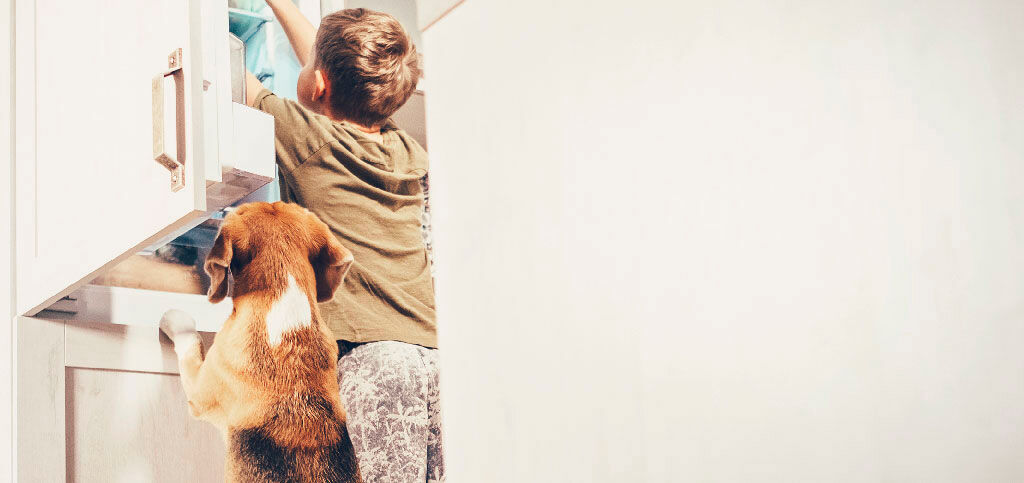Forbidden foods for dogs
There are many ’people foods’ that can undermine your dog’s well-being. In most cases, how much damage is caused depends on how much of whatever it is he’s eaten. But sensitivity, age and breed could mean that the impact is greater.
The forbidden foods that most commonly affect dogs are these:
1. Garlic and onions. These, together with their close cousins leeks and chives, can be toxic to your dog, particularly if he’s either an Akita or a Shiba Inu.
If your furry friend suffers from food poisoning after eating one of these foods, you could see symptoms such as weakness, paler than usual mucous membranes, a faster pulse or rapid breathing, and there could even be blood in his urine. It’s also very likely he’ll suffer from vomiting, diarrhoea and abdominal pain.
2. Ethanol or ethyl alcohol. Alcoholic drinks are harmful to dogs, as are other products that may contain alcohol such as raw bread dough.
These things can seriously affect your dog’s nervous system, and can lead to convulsions, respiratory and liver problems and even coma.
3. Chocolate, coffee, and tea. Just how toxic these are depends on how much of them your dog consumes, together with how much he weighs, but they should be avoided in any case.
Some of the harmful effects are hyperactivity, trembling and convulsions, tachycardia, arrhythmias and gastrointestinal problems. If your dog consumes any of these things, you should call the vet as soon as possible, as depending on the ‘dose’ they can be lethal if you don’t act fast.
4. Xylitol. This artificial sweetener is found in a lot of ‘people food’ products, so we strongly recommend that you study the list of ingredients carefully before giving him anything from your store cupboard.
Just how toxic it is depends on how much of it your dog consumes, but nonetheless it’s very possible that a few hours later he’ll suffer from vomiting, diarrhoea, lethargy, convulsions and problems that may be even more serious.
5. Macadamia nuts. The effect these have on your dog depends on his sensitivity to them, but they are another food that’s forbidden for dogs.
Some of the symptoms are gastrointestinal problems such as pain, vomiting, diarrhoea, weakness or rigidity in the legs, trembling...
6. Grapes. It’s not really clear why, but fresh grapes and derivative products such as raisins are harmful for your furry friend.
These foods can cause serious kidney problems, as well as anorexia, stomach pain, vomiting and diarrhoea.
7. Avocados. The toxins in avocados are found in the skin and the stone, so it’s unlikely that these will create serious problems for your dog.
If your furry friend were at home all alone and decided to devour a whole avocado off his own back, the signs of poisoning you’d see would be vomiting, diarrhoea, lethargy and anorexia.
8. Cow’s milk. Milk isn’t toxic in itself, but if you have an adult dog you should think twice before giving it to him, because in all probability he won’t be able to digest it properly. If he’s a puppy, it’s not a good idea to feed him cow’s milk because it doesn’t contain the nutrients he needs.
In the case of adult dogs, milk can cause dehydration and gastrointestinal problems which could become serious.
9. Small bones. Fine, brittle bones such as chicken bones can be dangerous.
These can cause lesions, punctures and other damage to your four legged-friend’s digestive system, as well as getting stuck in his throat and preventing him from breathing.
As well as these foods that are forbidden for dogs, there are many others that can be toxic, although they’re not as common. For example aubergines, almonds, mustard and cinnamon.
What should you do if your dog has eaten something toxic?
If you think your dog might have eaten any of these forbidden foods, and particularly if you notice any of the symptoms above, call the vet right away. In most cases, given the right treatment, there won't be any major problems.
Remember that as well as providing him with a high-quality diet that's healthy and balanced, prevention is the key to good health for your dog. So, if in doubt, don’t give him anything you’re not sure will be good for him.
 Copy link
Copy link
 Publish on Facebook
Publish on Facebook
 Publish on Twitter
Publish on Twitter
 Publish on WhatsApp
Publish on WhatsApp
